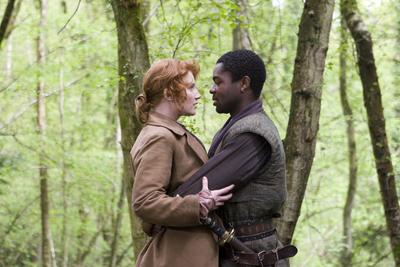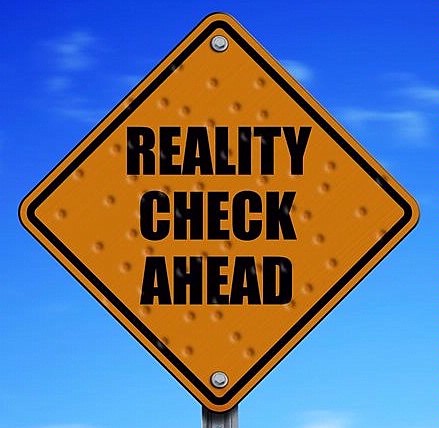Sorry guys. . . I realize I'm behind, and I apologize for that. Chalk it up to an insane schedule I guess. In this post, I'd like to wrap up As You Like It with my final analysis as well as my social discovery. Also. . . this is really long. . . but I had a lot to say. . .so sorry for that too.
Questions to be Resolved
Throughout this experience, I've butted heads with this play in a few different ways:

- Why did Shakespeare write this play?
- What's up with the whole "love at first sight" thing? It's so unrealistic.
- Why is Rosalind so often portrayed as being, quite obviously, a woman?
- In relation to the last question, did Shakespeare intend for it to be obvious for the purposes of building their relationship, or did he intend her disguise to be believable in order to play up the themes of homosexuality?
- Why are there all these references to cuckoldry mixed in? What is Shakespeare trying to say about women and marriage?
Social Discovery
I also took a look at what Cassandra Harper from our class had to say, since she also read As You Like It. She made some really good points. . . a recent post of hers, "All the World's a Stage" on her blog words....Words.....WORDS...., [particularly under the sections Artifice in the Play and The Epilogue informing the Theme?] , offered just the insight I was looking for.
If you don't have time to read it, here is a summary:
She basically talked about how there is all these instances of artifice and kind of putting on different "masks" and "other selves" in order to pursue ones goals. This stemmed from Jacques' speech on that follows his famed quote, "All the World's a stage", commenting on the seven different "roles" a man plays in his lifetime.

She focused mainly on Rosalind's facade of being "Ganymede" in addition to all of the other "roles" she played in her life, as well as how Orlando, when starving for food, thought that he had to become savage in order to survive when he was starving in the forest.
The second section mentions the epilogue, where Rosalind breaks fourth wall and asks the audience to enjoy the show for what it is.
One of her conclusions was that she believed Shakespeare possibly wrote this play as a way of showing his audience that we all have our "masks." Our behavior might change in different settings or with different people. What matters is how we use it.
* * *
After reading this, I wanted to find out more about what people were saying on the topic. It took some dedicated searching, but I finally stumbled upon this excerpt from a website 123helpme.com , from a longer analysis outlining deeper meanings in As You Like It:
 "Rosalind, under the disguise of being Ganymede, could get away with a lot more than she could as herself. As Rosalind, Ganymede could not te11 Phebe to "sell when you can, you are not for all markets." (Shakespeare 69) She could "spoof love and yet be a lover," (Gilman Ixiv) Through the tool of Ganymede, Rosalind was acting out "parts scripted for women by her culture." (Howard 198) She used the laws of society to achieve her own ends.
"Rosalind, under the disguise of being Ganymede, could get away with a lot more than she could as herself. As Rosalind, Ganymede could not te11 Phebe to "sell when you can, you are not for all markets." (Shakespeare 69) She could "spoof love and yet be a lover," (Gilman Ixiv) Through the tool of Ganymede, Rosalind was acting out "parts scripted for women by her culture." (Howard 198) She used the laws of society to achieve her own ends. Rosalind's disguised love-play is not merely a game with hapless Orlando, but an education: he must care enough to keep his promises and appointments, and respect her enough to speak as well as kiss.
She is "teaching her future mate how to get beyond certain ideologies of gender to more enabling ones." (Howard 198) Through her interactions with Orlando as Ganymede, Rosalind is accomplishing much. Her ultimate end is a "rational relationship," rather than one of "heady emotionalism." (Locket 2) She wished to keep her intelligence and dignity instead of having a relationship such as Audrey and Touchstone (based on lust) or Silvius and Phebe (based on his love of her "foulness"), but she still wanted the bliss of romance. "No wonder she seems so modern, and pleases so many modem audiences." "...Rosalind does not so much woo Orlando as educate him in the proper way to love." (Locket 1)"
"Deeper Meaning of Shakespeare's As You Like It." 123HelpMe.com. 26 Oct 2011
Drum Roll Please. . . Answers at Last! (Final Analysis)
To keep things simple, I suppose I"ll go through point-by-point with each question.
- Why did Shakespeare write this play?
As a way of showing his audience that we all have our "masks." Our behavior might change in different settings or with different people. What matters is how we use them.
- What's up with the whole "love at first sight" thing? It's so unrealistic.
 I've decided that Rosalind's and Orlando's relationship had a little more time to bud than I gave it credit for before. Yes, they're a little hasty to get married, but you have to take into account that he had to fit this into one play, and maybe didn't want to drag out the timeline. Rosalind's time as Ganymede was really her way of testing Orlando's faithfulness, and of giving him a reality check into what was to come in a relationship.
I've decided that Rosalind's and Orlando's relationship had a little more time to bud than I gave it credit for before. Yes, they're a little hasty to get married, but you have to take into account that he had to fit this into one play, and maybe didn't want to drag out the timeline. Rosalind's time as Ganymede was really her way of testing Orlando's faithfulness, and of giving him a reality check into what was to come in a relationship.Oliver and Celia also have the sort of Disney fairytale love-at-first-sight experience, followed by the oh-hey-we-just-met-let's-get-married bit. This still bothered me. . .but in the end I concluded that it was there to contrast the relationship between Orlando and Rosalind; their superficial relationship between a sort of villainous, vengeful guy and the sometimes superficial Celia.
I think if this story were to continue on into their married lives (assuming divorce was a possibility),
"Rosando" would be the last one standing.- Why is Rosalind so often portrayed as being, quite obviously, a woman?
- In relation to the last question, did Shakespeare intend for it to be obvious for the purposes of building their relationship, or did he intend her disguise to be believable in order to play up the themes of homosexuality?
 I've decided to answer these two questions together as they strongly relate. In all the versions that I've seen, it's pretty clear that Rosalind is in disguise, or at least that Orlando could have figured it out. I found it particularly interesting when Kenneth Branagh made this choice in his 2006 film adaption; Branagh is no stranger to Shakespeare, and he's a smart guy, so I don't think he did that for nothing. There's also a few references in the reading that make me believe Shakespeare might have intended it that way. I'm getting a little long-winded here, so I'll just mention one; after Ganymede's claims that Orlando is not a lover, he replies:
I've decided to answer these two questions together as they strongly relate. In all the versions that I've seen, it's pretty clear that Rosalind is in disguise, or at least that Orlando could have figured it out. I found it particularly interesting when Kenneth Branagh made this choice in his 2006 film adaption; Branagh is no stranger to Shakespeare, and he's a smart guy, so I don't think he did that for nothing. There's also a few references in the reading that make me believe Shakespeare might have intended it that way. I'm getting a little long-winded here, so I'll just mention one; after Ganymede's claims that Orlando is not a lover, he replies:Orlando: I would not be cured, youth.
Rosalind: I would cure you, if you would but call me Rosalind and come every day to my cote and woo me
Orlando: Now, by the faith of my love, I will. Tell me where it is.
Orlando, oddly enough, had just had a conversation with Jacques that suggested he had no intention of giving up his pursuits of love:
Jaques: The worst fault you have is to be in love.
Orlando: 'Tis a fault I will not change for your best virtue.So, his sudden agreement to be cured of love, in my opinion, is not because he actually wants to be "cured. It's becuse he kind of knows it's her, and wants to take advantage of this to woo her. And if I directed this show, that's exactly the direction I'd go with it.
 It's possible Shakespeare was open to having it being interpreted the other way, where Orlando really believes Ganymede is a boy and sort of . . .well, enjoys his lessons with him a bit too much, so as to further the themes of the "different kinds of love" and the homosexual interests going on . . . but that's just another interpretation. That's the great thing about Shakespeare I guess, it's flexible enough that you could go completely different directions with the same text.
It's possible Shakespeare was open to having it being interpreted the other way, where Orlando really believes Ganymede is a boy and sort of . . .well, enjoys his lessons with him a bit too much, so as to further the themes of the "different kinds of love" and the homosexual interests going on . . . but that's just another interpretation. That's the great thing about Shakespeare I guess, it's flexible enough that you could go completely different directions with the same text.- Why are there all these references to cuckoldry mixed in? What is Shakespeare trying to say about women and marriage?
Let me start out by saying that there really were TONS. And we're talking about extended metaphors where Shakespeare is like I'm-totally-talking-about-cuckoldry-so-pay-attention. I don't expect you to read through all of these, but just to show the sheer volume of these references, here they are via "Shakespeare Searched"
- Act 4, Scene 1
Rosalind
- Nay, an you be so tardy, come no more in my sight: I
- had as lief be wooed of a snail.
- Why, horns, which such as you are fain to be
- beholding to your wives for: but he comes armed in
- his fortune and prevents the slander of his wife.
- Act 4, Scene 2
- What shall he have that kill'd the deer?
- His leather skin and horns to wear.
- Then sing him home;
- Take thou no scorn to wear the horn;
- It was a crest ere thou wast born:
- Thy father's father wore it,
- And thy father bore it:
- The horn, the horn, the lusty horn
- Is not a thing to laugh to scorn.
- Act 4, Scene 1

Orlando
- Virtue is no horn-maker; and my Rosalind is virtuous.
- Act 4, Scene 2
Jaques
- Let's present him to the duke, like a Roman
- conqueror; and it would do well to set the deer's
- horns upon his head, for a branch of victory. Have
- you no song, forester, for this purpose?
- Touchstone
- Amen. A man may, if he were of a fearful heart,
- stagger in this attempt; for here we have no temple
- but the wood, no assembly but horn-beasts. But what
- though? Courage! As horns are odious, they are
- necessary. It is said, 'many a man knows no end of
- his goods:' right; many a man has good horns, and
- knows no end of them. Well, that is the dowry of
- his wife; 'tis none of his own getting. Horns?
- Even so. Poor men alone? No, no; the noblest deer
- hath them as huge as the rascal. Is the single man
- therefore blessed? No: as a walled town is more
- worthier than a village, so is the forehead of a
- married man more honourable than the bare brow of a
- bachelor; and by how much defence is better than no
- skill, by so much is a horn more precious than to
- want.

 I think this goes back to what I was saying before about the differences between the couples, how some the more artificial relationships seemed doomed to fail (Just look at what Touchstone is saying, he's so ready to marry to fulfill his lustful desires, that he flat out accepts that Audrey will cheat on him, and thinks that this is better than being a bachelor.)
I think this goes back to what I was saying before about the differences between the couples, how some the more artificial relationships seemed doomed to fail (Just look at what Touchstone is saying, he's so ready to marry to fulfill his lustful desires, that he flat out accepts that Audrey will cheat on him, and thinks that this is better than being a bachelor.)Rosalind, who did not want to accept this, then used her front as Ganymede to test Orlando ahead of time, and to give him a reality check about marriage, for example:
Act 4, Scene 1
Rosalind- Say 'a day,' without the 'ever.' No, no, Orlando;
- men are April when they woo, December when they wed:
- maids are May when they are maids, but the sky
- changes when they are wives. I will be more jealous
- of thee than a Barbary cock-pigeon over his hen,
- more clamorous than a parrot against rain, more
- new-fangled than an ape, more giddy in my desires
- than a monkey: I will weep for nothing, like Diana
- in the fountain, and I will do that when you are
- disposed to be merry; I will laugh like a hyen, and
- that when thou art inclined to sleep.
Connections to My Life
I've found that the idea of using our social masks appropriately related a lot to my life recently. I will be the first to confess that I am a different person in different places:
- The quirky, fun, loud, energetic person I am when I go home and see my real friends
- The quiet, reserved, easily embarrassed freshman/new girl who seems kinda stupid and never has anything to say (I revert to this whenever I move somewhere new, which is pretty common for me)
- The lazy, brutally honest, sometimes childish daughter who comes home for the weekend from College
- That irritating person we all become whenever someone casually asks "How are you?" and then we reply "Oh, I'm fine" . . . and you're thinking "Well, that was a total lie, but I really don't want to explain my train-wreck of a life to this person I barely know."
- The sophisticated woman in writing, who always articulates and expresses herself with finesse
- That awkward chick who can't explain things verbally to save her life
I don't know if any of these things make me "farcical" . . . .I don't think so anyway. . .but it makes me think of my recent experiences with directing in my theater class. I'm facing a lot of challenges where all of these people (except, hopefully, number three?) are having an external clash of the titans, and end up paralyzing my abilities as a director. What I now want to take away from this play is exploring how to channel my "masks" in a way that is most productive and effective, without abusing it or becoming "fake."


I think someone commented on this and then it got deleted when I edited it to add pictures :( sorry!
ReplyDeleteI like the "masks" of yourself that you came up with. I can identify with that. But for me, I feel like the masks change for me based on time (and my getting older), and not as much based on who I'm with. When I was a teenager, I was one way with my Mormon friends, one way with my non-Mormon friends, one way with my siblings, etc. But now I feel like I'm one way now and I was a little different six months ago, and six months before that I was a little different.
ReplyDeleteDoes that mean anything?
I guess some people's variances are more spatial, and others more chronological. I think we all change gradually over time though, myself included, just as a process of learning and growing. And I saw this in the play as well, Jacques goes on about how a man goes through these 7 stages in his life where he changes (over time) while Rosalind is acting out different personas in different situations within the same time frame.
ReplyDeleteAlso, maybe there is something to be said about variances in ones personality stabilizing as one matures.
ReplyDeleteI definitely think that's a sign of maturity, the ability to really know who you are and therefore not have to just go with the flow of whoever you happen to be hanging out with.
ReplyDeleteAwesome post friend.. Great work.
ReplyDeleteI am also curious why Shakespeare wrote this play and many other. That would be also find out where he found the motivation. By the way, most of the answers may be answered if you turn to special-essays.com and keep this coupon code too g6oa39rW
ReplyDelete